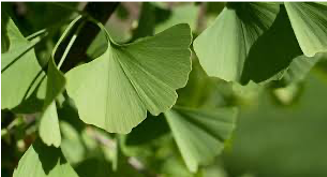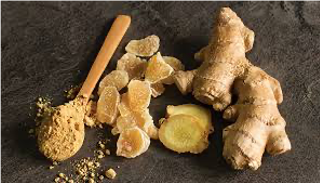From our resident food finder Krissy Billiczky
Today’s herb is Gingko Biloba
 Also known as the maidenhair tree, ginkgo is one of the oldest species of tree in the world. The trees can grow more than 130 feet tall and can live for over 1,000 years. Some trees in China are said to be over 2500 years old.
Also known as the maidenhair tree, ginkgo is one of the oldest species of tree in the world. The trees can grow more than 130 feet tall and can live for over 1,000 years. Some trees in China are said to be over 2500 years old.
The tree is considered to be a “living fossil,” meaning that it has continued to survive even after major extinction events.
Scientific research is limited but studies suggest that gingko biloba has the following benefits:
- gingko contains high levels antioxidants: flavonoids and terpenoids, that provide protection against oxidative cell damage from harmful free radicals – hence can help reduce risk of cancer
- can help fight inflammation due to high antioxidant levels
- improves circulation by promoting the dilation of blood vessels
- may improve cognitive function– due to its properties improving blood flow to the and in the brain
- can help with treating dementia and Alzheimer’s due to high content of flavonoids and their role in protecting against age related issues
- may help alleviate symptoms of anxiety and help with depression
- may improve eye health like glaucoma and delay macular degeneration
- may be an effective treatment for some types of headaches because of its ability to increase blood flow and reduce inflammation
- can improve symptoms of respiratory diseases like asthma, due to its anti-inflammatory properties
Ginkgo is available in capsule form, as tablets, liquid extracts, and dried leaf for teas.
Should be safe to take for most people following supplement guidelines, but the following people should avoid:
- children
- pregnant or breastfeeding women
- those with epilepsy
- people on blood thinners
- those on diabetes medication
If in doubt, s ever, please seek advice from a healthcare or medical professional.
Today’s spice is Ginger
 Ginger is a flowering plant that originated from China. It belongs to the Zingiberaceae family, and is closely related to turmeric, cardamom and galangal.
Ginger is a flowering plant that originated from China. It belongs to the Zingiberaceae family, and is closely related to turmeric, cardamom and galangal.
Ginger has a very long history of use in various forms of traditional and alternative medicine. It has been used to help digestion, reduce nausea and help fight the flu and common cold, to name a few.
Ginger can be used fresh, dried, powdered, or as an oil or juice, and is sometimes added to processed foods and cosmetics. It is a very common ingredient in recipes.
The unique fragrance and flavour of ginger come from its natural oils, the most important of which is gingerol. Gingerol is the main bioactive compound in ginger, responsible for much of its medicinal properties. It has powerful anti-inflammatory and antioxidant effect
Scientific research supports that ginger has the following benefits:
- ginger is effective for the treatment of many types of nausea, like morning sickness, travel sickness and chemotherapy related nausea
- may help reduce exercise induced muscle soreness
- can reduce symptoms of osteoarthritis due to its anti-inflammatory properties
- may help lower blood sugar levels therefore has beneficial effects on type 2 diabetes
- may be effective against menstrual pain
- can help lower cholesterol levels
- can help with cancer prevention due to a substance in raw ginger called 6-gingerol
- can protect against age-related damage to the brain
- can help lower the risk of infections due to the bioactive compound gingerol found in ginger
Ginger is safe to take and eat for healthy people.
If in doubt, as ever, please seek advice from a healthcare or medical professional.
Ginger can be found in fresh root or powder format.
